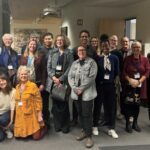 Executive Director Christina Loewen reflects on a week of convenings in Ottawa Nov 19-22, 2025
Executive Director Christina Loewen reflects on a week of convenings in Ottawa Nov 19-22, 2025
Two weeks ago was a whirlwind in Ottawa featuring not one but three incredible gatherings focused on the arts sector. First up was the Canadian Arts Coalition’s Arts Day on the Hill, followed by a major meeting called “Confluence”—a first-of-its-kind event that brought together arts funders and service organizations from across Canada. Hosted by the Canada Council for the Arts and organized by the amazing team at Mass Culture, Confluence aimed to spark big ideas, foster collaboration, and imagine a shared vision for the future of the arts in Canada. The third gathering was the meeting of Canadian Arts Funders that book-ended Confluence.
A Walk Down Memory Lane
For many of us, this national gathering felt like a homecoming of sorts. It’s been years since arts service organizations (ASOs) have convened in Ottawa alongside the Canada Council for the Arts. Some of us ancients remember when these meetings were an annual tradition, tied to events like Arts Day on the Hill and the Chalmers Conference. The last ASO meeting was in 2017, and since then, the world (and the arts sector) has seen enormous change. It was exciting to see this tradition reimagined and reinvigorated, especially with funders from across Canada also participating.
Day 1: Big Ideas and Bold Conversations
Day one kicked off with great coffee and a scone (thank you Scone Witch) for an early morning chat with the heads of the Canada Council for the Arts. They walked us through recent updates and what’s on the horizon for funding deadlines—a must-know to keep our members informed. At 9am, Director Michelle Chawla set the tone with a warm welcome, followed by afternoon breakout sessions tackling big themes like: Making the Case for the Arts, Diversifying Revenue and Alternative Models, and HR Practices and Supports.
The room buzzed with energy, and ideas were scribbled onto sheets for future synthesis. (Can’t wait to see what we came up with!) We wrapped up the day on a high note with the presentation of the John Hobday Award to Toyin Lafenwa Oladele, the inspiring founder of the Immigrant Council for Arts Innovation. The standing ovation she received was the perfect example of how awards should feel—uplifting and celebratory.
Day 2: New Perspectives and More Breakouts
Day two opened with a keynote by Alex Sarian of Arts Commons in Calgary. (Fun fact: Calgary is the place for the arts right now, thanks to Arts Commons receiving the largest arts philanthropic gift in Canadian history!) Alex’s talk focused on the leadership qualities needed for the future of the arts sector. The afternoon brought more breakout sessions, this time exploring themes like Navigating an Increasingly Polarized Environment, Revolutionizing Data and Knowledge Sharing, and Building Public Relevance for the Arts. These sessions were packed with insights, but I couldn’t shake the sense that we were starting from scratch in many conversations. With so many incredible initiatives already happening across the sector, I found myself missing the opportunity to tap into the “wisdom of the room” a bit more.
A Few Takeaways
While the two days were energizing, they also left me reflecting on how these gatherings (and our own at the AOC!) could be even better. For one, I’d love to see something like a marketplace or exhibit time at future events—a dedicated space to showcase the incredible projects already transforming the sector. And as someone who’s worked in arts convenings myself, I’m reminded of the power of good facilitation. It’s crucial to ensure everyone feels seen and heard, especially in a room filled with passionate, visionary people.
Looking Ahead
Thank you Canada Council for the Arts and Mass Culture! I truly hope these meetings become an annual tradition again. There’s so much momentum to build on, and the arts sector needs these kinds of opportunities to connect, collaborate, and move forward. Here’s to continuing the work, not just for those of us in the room, but for the communities and audiences who benefit from everything we do.

